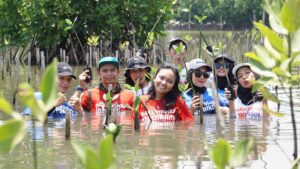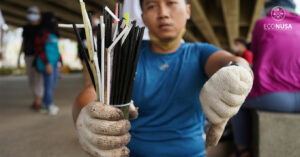
Ecotourism has become one of the utilization schemes of environmental services that can be applied in Papua. In its implementation, community involvement as the main subject of ecotourism development is a non-negotiable condition. Local people must feel the direct benefits of economic activities that occur.
This was conveyed by Bustar Maitar, CEO of EcoNusa Foundation, in a virtual discussion titled “Ecotourism Based on Indigenous Peoples for Indigenous Papuans” held by Mongabay Indonesia on Saturday 18 July 2020. According to Bustar, ecotourism management must be able to provide direct benefits, both economic benefits and social.
“The most important thing is how indigenous Papuans themselves are not just spectators. Not only workers, but they are the ones who manage and care for tourism objects, because that is their land and future, “Bustar Maitar said.
Ecotourism is defined as a trip or tour activity that is connected to nature and culture and is carried out responsibly. The concept of ecotourism was first implemented in Costa Rica in 1990, after the United Nations appointed the country in the African Continent to run the first ecotourism project in the world.
The Indonesian government’s support for the management of ecotourism is seen through Regulation of the Minister of Home Affairs (Permendagri) Number 33 of 2009 concerning Guidelines for the Development of Ecotourism in the Regions.
In the provisions contained in the Ministry of Home Affairs, ecotourism is defined as nature tourism activities in the area responsible for paying attention to the elements of education, understanding, and support for efforts to conserve natural resources, as well as increasing the income of local communities.
“Many activities claim to be ecotourism, but they are not. For example, taking pictures by riding a docile whale shark, picking up coral reefs, leaving trash on the mountain. The principles of education and conservation are also important to apply, “said Bustar.
According to Bustar, Tanah Papua has great potential for the development of ecotourism. The earth of paradise is home to a megabiodiversity that is inhabited by a variety of endemic flora and fauna, such as 125 species of mammals (55 percent endemic), 223 species of reptiles (35 percent endemic), 602 species of birds (52 percent endemic), and 15,000-20,000 plant species .
Papua’s wealth does not stop with natural resources. The socio-cultural complexity in Tanah Papua can be an attraction that can be offered to tourists. There, there are 255 indigenous tribes who live side by side using 384 different languages.
Bustar said, EcoNusa also supported the development of ecotourism in a number of areas in Tanah Papua, such as photo spots on Yapen Island, Papua, bird watching in Sorong, West Papua, climbing Mount Cartensz, Papua and homestay management in Raja Ampat, West Papua.
“What’s interesting in Raja Ampat, 75 percent of accommodation is managed by native Papuan children. The service is very family. This must be supported by the government, not pushing big resorts in and then Papuans only become workers, “Bustar said.
Bustar said, in the last two years EcoNusa helped homestay associations in Raja Ampat by standardizing homestay management. This is to improve community competence through various training. In early February 2020, EcoNusa gathered dozens of ecotourism actors to share their experiences.
“They strengthen each other. ‘Oh, it turns out we Papuans can do it’. The community must be strengthened first. If an outside entrepreneur, once nature has been damaged, he can go elsewhere to build his business. But for young Papuans, nature is their future, “Bustar said.
Editor: Leo Wahyudi







